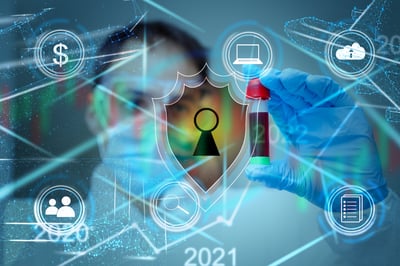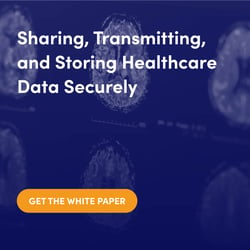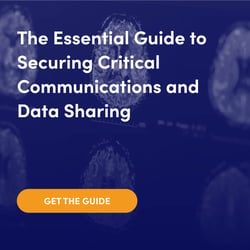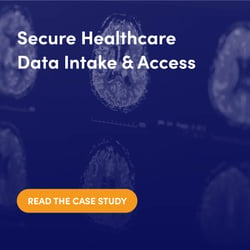Healthcare data security: Why is your health data in danger?
The progress of digitalization in the healthcare industry undeniably reached a new high in the last few years. With advances in cloud computing, Artificial Intelligence (AI), and new software, healthcare is quickly becoming an industry that heavily relies on modern IT, taking in its advantages as well as risks.
It’s no exception nowadays for patients to engage with healthcare providers and professionals without giving up the comfort of their homes. From setting up an appointment online, providing their personal data via digital forms, and talking to a doctor on a video call – all the way to receiving medical information (like diagnosis or medicine prescriptions) via email.
From healthcare professionals’ perspective, digitalization means faster access to patients’ medical data in a digital form as well as easier collaboration with their colleagues, no matter the location.
 Thanks to the inclusion of modern tech, the “new” healthcare industry is better at analyzing medical data, more precise in diagnoses, and thus faster in delivering needed care.
Thanks to the inclusion of modern tech, the “new” healthcare industry is better at analyzing medical data, more precise in diagnoses, and thus faster in delivering needed care.
But amidst this era of modernization and convenience, the security of healthcare data is lagging. Digital healthcare data is indeed easier to access, analyze, or share. But it is also more vulnerable to data breaches, unauthorized use, and compliance violations, and it is much more likely to be a valuable target for cybercriminals.
Contents
Why should healthcare institutions focus on data security?
How can healthcare organizations improve their data security?
Healthcare data security with SSH Zero Trust solutions
Why should healthcare institutions focus on data security?
Patient records, medical data, and research findings are at the core of the healthcare industry. And safeguarding this sensitive information is not just a regulatory requirement but a moral obligation. Data breaches and cyberattacks not only jeopardize patients’ privacy but can also disrupt vital healthcare services.
For example, a recent healthcare data breach that occurred in the USA showcases the danger of using unsecure channels to handle patient data.
The Colorado Department of Health Care Policy and Financing (HCPF), which is responsible for administering Colorado’s Medicaid program, got targeted by MOVEit mass hacks in August 2023. Consequently, over four million Americans had their sensitive medical and health information stolen, including personal details spanning from social security numbers to health insurance information.
HCPF stated that the healthcare data was compromised because IBM, one of the state’s vendors, used the MOVEit application to move data files in the normal course of business.
 The repercussions of compromised medical data can be significant, affecting healthcare institutions (including fines, financial losses, and operational disruptions) as well as patients themselves (like potential identity thefts).
The repercussions of compromised medical data can be significant, affecting healthcare institutions (including fines, financial losses, and operational disruptions) as well as patients themselves (like potential identity thefts).
By prioritizing robust data security measures, healthcare institutions not only protect patient privacy and trust but also ensure the uninterrupted flow of care and the advancement of medical science, ultimately saving lives and shaping a safer healthcare future.
How can healthcare organizations improve their data security?
When sharing and storing electronic health information, organizations should consider these key points:
- Identify the person(s) with access to sensitive information.
- Use strong authentication.
- Use strong encryption.
- Restrict the level of access (notify, read-only, edit, admin).
- Limit the number of people with access to sensitive data.
- Verify sender/recipient or collaborators when sharing sensitive data.
- Audit and track every access and session.
- Outsourced service providers and third parties need to comply.
- Use authorized channels only.
- User experience.
Healthcare data security with SSH Zero Trust solutions
We at SSH Communications Security know all the ins and outs of communication and data security. Our SSH Zero Trust solutions are designed to help you share healthcare and patient data securely while staying compliant with industry regulations.
By using authorized and secure tools to share and store your sensitive data, you can prevent data breaches as well as mitigate the risks of human errors and targeted cyberattacks.
Learn more about our healthcare data security solutions here >>>
Related content:
Jani Virkkula
Currently employed by SSH.COM as Product Marketing Manager, Jani is a mixed-marketing artist with a strong background in operator and cybersecurity businesses. His career path of translator->-tech writer -> marketer allows him to draw inspiration from different sources and gives him a unique perspective on all types...



